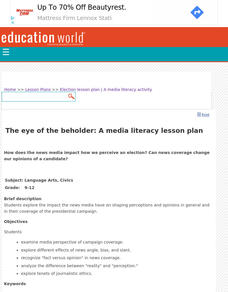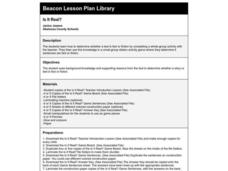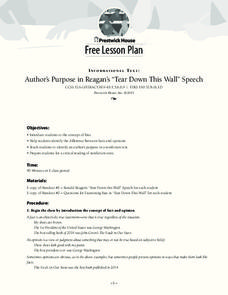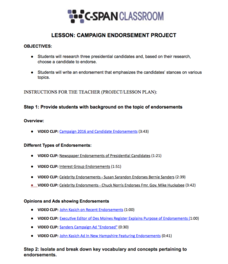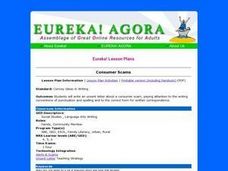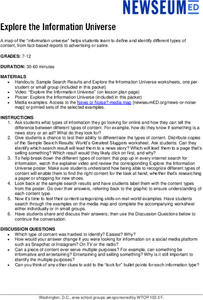Curated OER
Expository Writing (Informational Brochure)
Design an informational brochure to urge people to move to a specific community. The purpose of this activity is to expose pupils to expository writing. After creating the brochure, they write a three-paragraph persuasive or...
Media Smarts
Authentication Beyond the Classroom
In an age of fake news, alternative facts, and Internet trolls it is essential that 21st Century learners develop the skills they need to authenticate the facts in viral news. Here is a great way to begin with a resource that...
Curated OER
CHRISTMAS FILM REVIEW
High schoolers write reviews of films they have seen over the Christmas holidays. They study what the ingredients of a film review are, and examine the difference between fact and opinion.
Curated OER
Good News/Bad News/Who Cares?
Students practice evaluating facts, bringing to bear their own experience, preferences, and international contexts. They recognize that there are many ways of interpreting a single piece of information and form the habit of reflecting...
Curated OER
The Eye of the Beholder: A Media Literacy Activity
Students explore the impact the news media have on shaping perceptions and opinions in general and in their coverage of the presidential campaign.
Curated OER
Is It Real?
First graders see how to determine whether a text is fact or fiction by completing a whole-group activity with the teacher. They use this knowledge in a small-group station activity game where they determine if sentences are fact or...
Curated OER
What Is the Nature of Science?
Students distinguish between scientific and everyday meanings of key words-theory, hypothesis, law, fact-and use in context. They recognize the variables that affect observation, data collection, and interpretation. They discover the...
Curated OER
Opinion/Facts: letters to the editor and endorsement
In this opinion and facts worksheet, students write the opinion and facts of letters to the editor that are for and against a candidate running for office. Students also write the propaganda technique used and example of an endorsement...
Prestwick House
Author’s Purpose in Reagan’s “Tear Down This Wall” Speech
President Ronald Reagan's "Tear Down This Wall" speech, delivered on June 12, 1987 before the Berlin Wall, provides class members with an opportunity to examine three key aspects of informational text: author bias, the use of facts and...
Curated OER
Conventions: Strong Verbs
Fifth graders practice using strong verbs. In this conventions lesson plan, 5th graders brainstorm words to complete sentences and list lively and exciting verbs. Students act out meanings of certain words. Students come up with new ways...
Curated OER
Equal Protection of the Law: Fact or Fiction
High schoolers focus on the 14th Amendment of the Bill of Rights to decide whether or not racism denies citizens of their rights under the amendment. They watch a movie, Every Two Seconds and complete a worksheet (included in the plan)...
Beyond Benign
Medical Ethics
Just because we have the ability to determine an organism's traits through genetic testing, should we do it? Middle-school medical experts examine the ethical dilemmas in biotechnology in the 18th and final installment in a series of...
The New York Times
Evaluating Sources in a ‘Post-Truth’ World: Ideas for Teaching and Learning about Fake News
The framers of the United States Constitution felt a free press was so essential to a democracy that they granted the press the protection it needed to hold the powerful to account in the First Amendment. Today, digital natives need to...
Curated OER
Is That a Fact, Harry?
Students use excerpts from books to determine whether sentences are fact, fiction, or opinion. They state reasons for their choices.
Curated OER
Persuasive Writing - Anticipating Opposing Views
Persuasion, when used effectively, is a powerful and effective tool. In groups, young writers develop a persuasive letter about something that they would like their parents to allow them to do. Then, independently, they use proper...
Newseum
The Fundamentals of News
A short video introduces middle schoolers to different media-related news terms. Viewers then complete a worksheet and discuss the differences between news and journalism, between facts and opinions.
Newseum
Weighing the Arguments
To understand how personal perspectives can affect policy and politics, scholars examine the woman suffrage media map and historical artifacts to analyze arguments for and against women's suffrage. Class members then take on the role of...
Curated OER
Don't Let the Earth Down
Writing a persuasive argument starts with a clear thesis. Using this resource, your class will write a persuasive paper on a conservation issue. They will then transform their argument into a 30-second public service announcement. If...
C-SPAN
Campaign Endorsement Project
So many politicians, so many endorsements! Learn to differentiate between facts as well as the process of endorsements with an informative resource. Class members watch current endorsement videos, research candidates from three different...
State Bar of Texas
Engel v. Vitale
Can you bow your head and pray in school? Scholars investigate the issue of school prayer with the Supreme Court case Engel v. Vitale. A short video clip along with paired group work helps viewers form opinions on the matter. They answer...
Curated OER
Convey Ideas in Writing
Use the platforms of the 2004 presidential candidates to bring persuasive writing to your class. Young voters identify the three issues most important to them in the election and research the issues and candidates' positions. They write...
Newseum
Fake News Through History: Analyzing Historical Sources
Unfortunately, fake news, fuzzy facts, and bogus news stories are not new phenomena. Class members use a "Fake News Through History" worksheet to analyze historical examples of false, invented, made-up news. Researchers share their...
Newseum
Explore the Information Universe
Distinguishing among different types of content when conducting online searches can be a challenge. An informative resource helps researchers identify different types of content, from fact-based reports to ads, from propaganda to satire....
Curated OER
Understanding and Using Primary and Secondary Sources in History
Explore primary and secondary sources in this historical analysis lesson. Young researchers define the terms primary source and secondary source. They read a primary source document provided by the teacher and answer questions about...
Other popular searches
- Fact Opinion Lesson Plans
- Fact and Opinion Passages
- Fact Opinion Worksheet
- Fact and Opinion Lessons
- Teaching Fact vs. Opinion
- Fact and Opinion Worksheets
- Teaching Fact and Opinion
- Fact and Opinion Games
- Reading Fact and Opinion
- Fact and Opinion Keywords
- Identifying Fact or Opinion
- Fact Opinion Quiz




